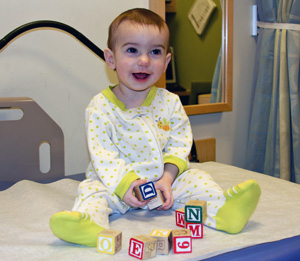CDGEMM Study
The Celiac Disease Genomic Environmental Microbiome & Metabolomic Study follows infants from birth through childhood to learn more about each of the many factors that contribute to the development of celiac disease.
Join us! Come participate in the Celiac Disease Genomic Environmental Microbiome and Metabolomic (CDGEMM) study.

Who can participate?
Infants must have a first-degree relative (mother, father, brother or sister) who is diagnosed with celiac disease to be eligible to participate. Infants must also have not yet been introduced to solid foods. If you are currently pregnant, and your infant-to-be will fulfill these criteria, you can get the enrollment process started – even before birth!
What’s involved?
Your child will complete a study visit every six months until they reach 5 years of age. Not all visits will involve all of the following procedures; we will inform you when it is time for a visit and what is required at that visit.
Screening and Enrollment
Once your baby is born, we will first ask you to fill out a questionnaire addressing your medical history, diet and pregnancy. All of this information is important so that we can fully understand all of your baby’s GEMM details. We will also ask you to provide a stool sample and a breast milk sample, in addition to taking a stool sample from your baby.
Stool Collections
We will collect your baby’s stool during the study period to look at the bacteria in your child’s intestines. This will help us fulfill the microbiome and metabolomic components of the CDGEMM study. We will provide you with all of the materials necessary to collect and return the sample.
Blood Draws
We will draw your baby’s blood during the study period to monitor them for markers of CD. We will also use the blood that we draw to see if your child has the HLA-DQ2/DQ8 genes. We will tell you if your child has these genes or not. We will also tell you the results of your child’s blood work each time blood is drawn so that you will know if your child develops celiac disease while they are enrolled in the study.
Collection of Clinical Data
Every six months we will ask you to answer general questions about your child’s medical history, illnesses, and growth. In addition, for the first year we will ask you to complete food and antibiotic diaries regarding your baby’s diet, allergies and antibiotic use. The answers to these questions will help us understand your child’s environment so that we can study how it relates to the blood and stool samples that they provide.

